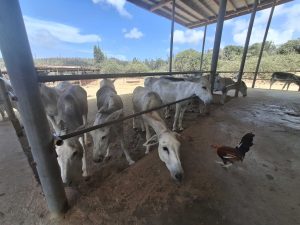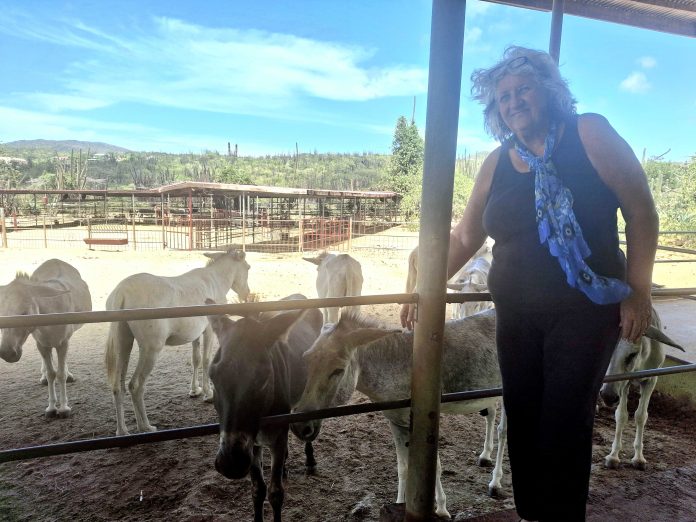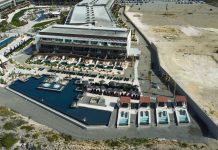(Oranjestad)—For 28 years now, Donkey Sanctuary Aruba has been providing help and assistance to donkeys in Aruba. A project that started with 10 donkeys has now expanded to more than 130. In an interview with Bon Dia Aruba, the director of Donkey Sanctuary Aruba, Mrs. Desiree Eldering, shared the vision, work, and future goals of the donkey sanctuary.
Eldering explained that they started the sanctuary 28 years ago after noticing how many donkeys were being mistreated and struck by cars.
She explained that Donkey Sanctuary is a non-profit organization that mainly operates with volunteers, though they also have some paid employees. The mission of the organization is to preserve the donkeys of Aruba. But very quickly, they discovered that there was a lot of inbreeding among the donkeys, which resulted in health problems such as chronic infections in their hooves, dental problems that prevent them from grazing properly since they need an exact bite to pull grass, and other serious health issues.

In addition, they faced problems with joints lacking cartilage, heart failure, kidney failure, and different other diseases.
At that point, the organization decided not to continue breeding donkeys with these health conditions because their goal is for the donkey breed to survive in Aruba. “The donkeys arrived in Aruba more than 500 years ago because the Spaniards brought them here over 500 years ago. So, we started castrating all the males that came in, and we always said we wanted to begin a controlled breeding program with fresh blood from Bonaire, Curaçao, Colombia, Venezuela, to make them healthy again,” Eldering explained.
She continued, explaining that it takes about 10 generations before you can have healthy donkeys again. Finally, two years ago, the organization brought in four donkeys from Bonaire, and so far, they have two foals. Unfortunately, both foals are male, and to continue the breeding process, they need females.
“We are still working on this. We are also waiting for two donkeys to arrive from Curaçao soon, just to bring a bit of variety, because if you only breed with one donkey, it doesn’t work, so you need more chances. We hope that with more donkeys on the island, we will have more babies. We are doing everything possible to create healthy donkeys again. Many people think, oh, sanctuary, you are a rescue, so why are you breeding? We are breeding because we want to preserve them, and if we don’t do that, then eventually they will die out. We believe that donkeys are part of Aruba’s history and culture,” she added.
Eldering also mentioned that the sanctuary carries out rescue work. There are still many donkeys roaming in different areas, for example near Baby Beach, in Arikok Park near Jamanota, and recently they found out that donkeys have returned to Natural Bridge.
If something is wrong with those donkeys, the sanctuary goes out to see how they can help. She shared that a few weeks ago they received a phone call from someone who found a donkey that had been attacked by dogs, and the animal was in terrible condition. She explained that the donkey’s legs were severely injured, one of its testicles was missing, and its ears and mouth were bitten everywhere. Sadly, the veterinarian had to put the donkey to sleep because there was no way it could walk again.
She emphasized that if people call because they are worried about a donkey, the sanctuary always sends someone to assess the situation to see if the animal is truly in need, and if so, they help it.
She also commented that although dog attacks on donkeys are not frequent, when they do occur, they are horrible. At the same time, she expressed concern and highlighted the need to find a solution to the problem of stray dogs on the streets, to prevent attacks not only on donkeys but also on other animals and people.
As for Donkey Sanctuary’s plans for the future, she explained that for now they remain focused on breeding in order to have healthy donkeys again and to preserve the breed for the years ahead.
On the awareness side, Eldering emphasized that when it comes to feeding donkeys, specifically those near Baby Beach, it is important for the community and tourists to know what they can and cannot feed them. She pointed out that sometimes people give the donkeys bread, chicken nuggets, or chips, which are not healthy for them.
She stressed that donkeys are herbivores, meaning they primarily eat grass and plants, but if people want to feed them, it’s okay to give them an apple or carrot, but not bread or chicken nuggets.
She explained, for example, that chicken contains protein, and protein is not good for donkeys. If donkeys consume protein while pregnant, the babies become too large for the mother to give birth, and as a result, both mother and baby can die. She also pointed out that people should be aware that donkeys standing near the road are trying to approach cars to find food, which puts them at risk of being hit by vehicles.
“Be kind to animals, they don’t deserve to be mistreated. Be kind to them. And if you see a donkey in need, even if you’re not sure, just call us, and we will send someone to check on what is happening,” she concluded.
For those who want to support the beautiful work of preserving and ensuring the welfare of donkeys in Aruba, this can be done through donations—which cover the daily operations of this valuable foundation—or by volunteering, since an extra helping hand is always needed. You can contact Donkey Sanctuary by calling +297 593 2933.
















